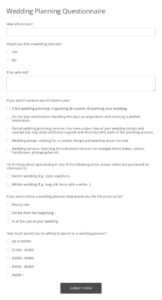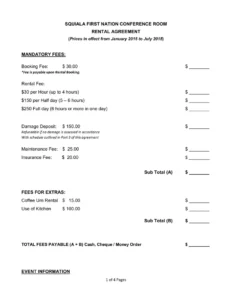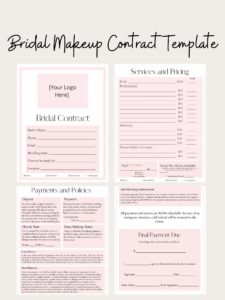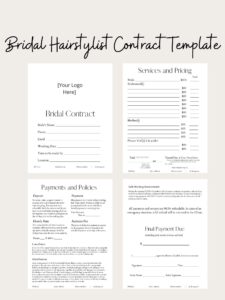Planning an event, whether it’s a grand wedding, a corporate conference, or a local festival, often involves renting a variety of equipment. From sound systems and lighting rigs to tables, chairs, and specialized décor, these items are essential for setting the right atmosphere and ensuring everything runs smoothly. However, the excitement of event planning can sometimes overshadow the critical administrative details that protect both the equipment provider and the client.
That’s where a well-structured agreement comes into play. Having a clear, comprehensive contract isn’t just a formality; it’s a foundational safeguard for everyone involved. It outlines expectations, responsibilities, and ensures that misunderstandings are minimized, allowing everyone to focus on making the event a success rather than dealing with unexpected disputes.

Why a Solid Event Equipment Rental Contract is Your Best Friend
In the world of event rentals, an unforeseen hiccup can quickly turn into a major headache, or even a costly legal battle. Imagine equipment getting damaged, returned late, or not being paid for on time. Without a clear agreement, resolving these issues can be incredibly challenging. This is precisely why an event equipment rental contract template is so vital; it acts as a blueprint for a fair and professional transaction, protecting the interests of both the rental company and the client.
Think about it: from the moment the equipment leaves the rental facility until it’s safely returned, a lot can happen. Weather conditions can change, accidents can occur, and even the best-laid plans can encounter unexpected delays. A comprehensive contract anticipates these potential issues and outlines exactly how they will be handled, preventing guesswork and costly disagreements down the line. It transforms potential conflict into clear, pre-agreed solutions.
Key Elements Your Contract Must Include
When you’re putting together or reviewing an event equipment rental contract template, there are several non-negotiable sections that absolutely need to be present to ensure all bases are covered. Skipping any of these could leave critical gaps in your protection.
- Identification of Parties: Clearly state the full legal names and contact information for both the rental company and the client. This seems basic, but it’s fundamental.
- Equipment Description: Provide a detailed list of every item being rented, including model numbers, quantities, and any specific identifying features. Photos can be a great addition here.
- Rental Period and Fees: Specify the exact start and end dates and times for the rental, along with the total rental cost, payment schedule, and any applicable taxes or deposit requirements.
- Delivery and Pickup Details: Outline who is responsible for transport, the location, dates, and times for delivery and collection, and any associated setup or teardown services.
- Payment Terms: Detail when payments are due, accepted payment methods, and consequences for late payments.
- Damage and Loss Clause: This is crucial. It defines what constitutes damage, who is responsible for repair or replacement costs, and what happens in case of theft or irreparable loss.
- Liability and Indemnification: This section clarifies who is liable for injuries or damages occurring from the use or misuse of the equipment during the rental period.
- Cancellation Policy: Clearly state the terms under which either party can cancel the agreement, including any associated fees or deposit forfeiture.
- Force Majeure: Address circumstances beyond anyone’s control (like natural disasters) that might prevent the contract from being fulfilled.
- Governing Law: Specify which state’s or region’s laws will govern the contract in case of a dispute.
By meticulously including these elements, you create a robust agreement that leaves little to interpretation. It ensures that both parties understand their rights and obligations before the event even begins, fostering trust and professionalism.
Tailoring Your Event Equipment Rental Contract Template to Your Specific Needs
While a good event equipment rental contract template provides an excellent foundation, it’s rare that a single template will perfectly fit every single event or rental scenario without some customization. Think of it as a quality suit; it might look great off the rack, but it truly shines when it’s tailored to your exact measurements. This personal touch ensures the contract addresses the unique nuances of your specific rental agreement.
For instance, renting a small sound system for a local band’s gig is very different from providing a complex staging setup, full lighting, and projection equipment for a multi-day corporate expo. The risks, responsibilities, and logistical requirements vary wildly. Your template needs to be flexible enough to accommodate these differences, perhaps by adding specific clauses for on-site technicians, specialized insurance requirements, or unique delivery access challenges.
Always consider the type of equipment being rented and the environment it will be used in. Are you renting delicate electronics that require specific handling instructions, or heavy-duty outdoor equipment that might face inclement weather? Each scenario calls for slightly different protective language within the contract. This proactive approach helps to foresee and mitigate potential problems before they arise, ensuring a smoother rental experience for everyone involved.
Moreover, it’s wise to have any significant customizations or specialized clauses reviewed by legal counsel, especially if you’re dealing with high-value equipment or large-scale events. Local regulations and industry standards can also influence what needs to be included, or how certain terms are phrased. Don’t be afraid to make your template work for you, rather than trying to force your unique situation into a generic mold.
Having a robust, customized contract in place offers peace of mind that is truly invaluable. It minimizes risks, fosters clear communication, and ensures that everyone understands their role and responsibilities from start to finish. This diligence allows you to focus on the exciting aspects of event planning and execution, confident that the logistical and financial bases are well-covered.
Ultimately, a well-crafted agreement isn’t just about protecting yourself; it’s about building a foundation of trust and professionalism with your clients or suppliers. It demonstrates a commitment to clarity and fairness, setting the stage for successful events and positive, long-term relationships in the competitive world of event services.



